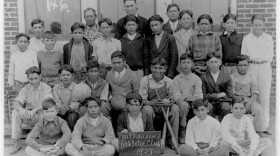
Melissa Block
As special correspondent and guest host of NPR's news programs, Melissa Block brings her signature combination of warmth and incisive reporting. Her work over the decades has earned her journalism's highest honors, and has made her one of NPR's most familiar and beloved voices.
As co-host of All Things Considered from 2003 to 2015, Block's reporting took her everywhere from the Mississippi Gulf Coast in the aftermath of Hurricane Katrina to the heart of Rio de Janeiro; from rural Mozambique to the farthest reaches of Alaska.
Her riveting reporting from Sichuan, China, during and after the massive earthquake in 2008 brought the tragedy home to millions of listeners around the world. At the moment the earthquake hit, Block had the presence of mind to record a gripping, real-time narration of the seismic upheaval she was witnessing. Her long-form story about a desperate couple searching in the rubble for their toddler son was singled out by judges who awarded NPR's earthquake coverage the top honors in broadcast journalism: the George Foster Peabody Award, duPont-Columbia Award, Edward R. Murrow Award, National Headliner Award, and the Society of Professional Journalists' Sigma Delta Chi Award.
Now, as special correspondent, Block continues to engage both the heart and the mind with her reporting on issues from gun violence to adult illiteracy to opioid addiction.
In 2017, she traveled the country for the series "Our Land," visiting a wide range of communities to explore how our identity is shaped by where we live. For that series, she paddled along the Mississippi River, went in search of salmon off the Alaska coast, and accompanied an immigrant family as they became U.S. citizens. Her story about the legacy of the Chinese community in the Mississippi Delta earned her a James Beard Award in 2018.
Block is the recipient of the 2019 Murrow Lifetime Achievement Award in Journalism, awarded by the Edward R. Murrow College of Communication at Washington State University, as well as the 2019 Lifetime Achievement Award from the Fulbright Association.
Block began her career at NPR in 1985 as an editorial assistant for All Things Considered, and rose through the ranks to become the program's senior producer.
She was a reporter and correspondent in New York from 1994 to 2002, a period punctuated by the terrorist attacks of Sept. 11. Her reporting after those attacks helped earn NPR a George Foster Peabody Award. Block's reporting on rape as a weapon of war in Kosovo was cited by the Overseas Press Club of America in awarding NPR the Lowell Thomas Award in 1999.
Block is a 1983 graduate of Harvard University and spent the following year on a Fulbright fellowship in Geneva, Switzerland. She lives in Washington, DC, with her husband — writer Stefan Fatsis — and their daughter.
-
Lyndon Johnson taught in the South Texas town of Cotulla in 1928. Even as president, he always remembered the grinding poverty of his students.
-
The boom has brought unexpected prosperity — and many new problems — to Cotulla. It's in the heart of the Eagle Ford Shale area, which has quickly become the nation's No. 2 oil-producing region.
-
Melissa Block and Audie Cornish read letters from listeners about the demands made on students and student-athletes in college.
-
The Kentucky Wildcats and the Connecticut Huskies take the court in Monday's NCAA men's college basketball final. NPR's Tom Goldman talks to Melissa Block about what to watch for in the game.
-
In Killeen, Texas, another mass shooting had some asking, "Again?" The flags flew at half staff as the community began to pick up the pieces.
-
From Killeen, Texas, where Fort Hood is based, Melissa Block talks to soldiers who were on base during the shooting, as well as with Killeen's mayor. The mayor explains how the town is trying to cope.
-
Hispanics now make up 38 percent of Texas residents. One demographer says the state's future is tied to the success of its growing minority population. Schools may be part of the solution.
-
An injured leg can cause so much pain that some wounded veterans consider amputation. A brace invented at an Army medical center in Texas is getting them up and running again.
-
The Oxford English Dictionary is adding some 900 new words and phrases to its pages, with wackadoodle, bestie and DIYer among them. Melissa and Robert review some of the new entries.
-
Melissa Block and Robert Siegel read emails from listeners about Game of Thrones and The Big Broadcast.
-
President Obama's pitch for his health care law has brought him to an awkward place: "Between Two Ferns." In a bid to up the enrollment of young people, Obama visited Zach Galifianakis' Internet show.
-
In Moscow, Russian President Vladimir Putin defended his position on Ukraine. In a news conference, Putin denied that Russian troops are in Crimea but reserved the right to use force in Ukraine.




